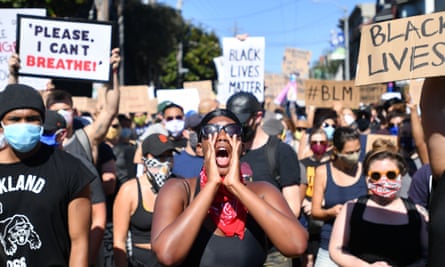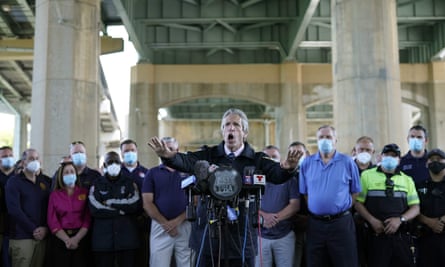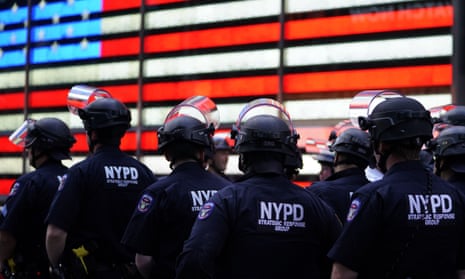As protests against police brutality continue across the US, a new tactic is emerging to combat the huge influence of police unions: kicking them out of the American labor movement.
Police unions and labor groups, like other unions, usually represent their members in debates over pay and working conditions. But they are controversial for being dominated by white leaders, often deeply conservative and hostile to criticism of police officers or attempts at police reform.
This week the Writers Guild of America, East – a trade union of TV writers and digital journalists – called for the removal of the International Union of Police Associations from the AFL-CIO, the labor federation which represents them both.
“As long as police unions continue to wield their collective bargaining power as a cudgel, preventing reforms and accountability, no one is safe,” the Guild said in a press release. “Therefore we believe that police unions do not belong in our labor coalition.”
The Writers Guild is the first AFL-CIO affiliate to demand IUPA’s expulsion from the nation’s largest labor federation. That demand reflects a central tension between police unions and the broader labor movement, and points to a gulf that has historically existed between them. In the last few days and weeks, that gulf has seemed to be getting bigger.
Following the police killings of African Americans George Floyd in Minneapolis and Breonna Taylor in Louisville, labor organizations that count police officers among their members are being forced to reckon with their position as a national debate over racism spreads.

“There are real questions about being an anti-racist organization if you also represent police,” says David Unger, a CUNY School of Labor and Urban Studies staff member.
Last week, the King county Labor Coalition told the Seattle police to confront its racism problem or be kicked out of the coalition. The Association of Flight Attendants-CWA also issued a resolution arguing police unions should be “removed from the Labor movement” if they cannot address racism within their ranks.
But the situation is not simple. Not all police departments are unionized, and of the ones that are, many are not affiliated with a larger labor federation like the AFL-CIO.
More than 350,000 officers are organized under the Fraternal Order of Police, an independent trade union. But the demand to expel the IUPA – which claimed more than 100,000 members last year – from the AFL-CIO is a sign that organized labor may be beginning to reconsider its relationship to police unions.
But if the labor movement is going to change, it will probably need to be from the ground up. On Tuesday, the AFL-CIO acknowledged police violence as a labor issue (“it happens in our backyards and to our families”), but argued it was better to retain IUPA as an affiliate than to “isolate” them.
Kicking police officers out of the labor movement would be a long and complicated project, as it raises the question of who is a law enforcement officer. IUPA, for example, also represents some emergency medical responders and corrections officers. “Technically, school crossing guards are with the NYPD,” said Unger.
Since their inception, police unions have also often proven to be politically adept and effective in blocking legislation or reforms that would hold their members to wider scrutiny.
Unions like the Police Benevolent Association, which represents police officers in New York City and other cities “and the Fraternal Order of the Police, they’re not like traditional labor unions”, said Christopher Hayes, a labor historian at the Rutgers School of Management and Labor Relations. “They look out almost entirely for themselves, they have no visible commitment to social justice.”
In New York City, the PBA (originally called the Patrolmen’s Benevolent Association) is famous for accusing the city of taking resources away from uniformed men and women. In 1966, the then mayor, John Lindsay, wanted to add four civilians to the Civilian Complaint Review Board, an independent agency created to investigate police misconduct – which would have made it majority-civilian for the first time.
The PBA responded with a massive campaign to defeat the proposed restructuring. Their argument against, as WNYC wrote in 2016, was coded in racist language. “I am sick and tired of giving in to minority groups, with their whims and their gripes and shouting,” said the then head of the PBA, John Cassese.

Police unions have several ways to protect their members and limit what they can be held accountable for – from arbitration, in the event a police officer is fired for misconduct, to fighting to keep disciplinary records confidential.
The head of the Minneapolis police union, Bob Kroll, has effectively blocked potential reforms for years, even by a former police chief’s standards. He has also led the federation while proudly broadcasting his politics, calling Donald Trump “wonderful” after meeting with him in 2019.
Kroll is also frequently hostile to black people; he has referred to Black Lives Matter as a “terrorist organization” and once allegedly referred to Keith Ellison as a “terrorist”. Last week, he classified George Floyd as “violent criminal” based on the fact he had served prison time, in an openly racist attempt to defend Derek Chauvin, the officer who killed Floyd.
Kroll is probably aware that police departments’ most powerful leverage is their public image. Police unions have “cultivated almost like a hero worship of the police”, said Hayes.
That means that the process of reducing gargantuan police budgets will likely involve challenging the narrative that a well-oiled, militarized police force with deep pockets always results in higher public safety.
Whether they remain within or without the AFL-CIO, police unions are likely to retain their power – unless city and state leaders exercise the political will to challenge them.
“In collective bargaining, you don’t have to agree to what the other side wants,” said Alex Colvin, the dean of the Cornell ILR School. “So the police unions [can] certainly demand good wages and job protections for their members, but there’s nothing saying the city government has to give that to them.”
